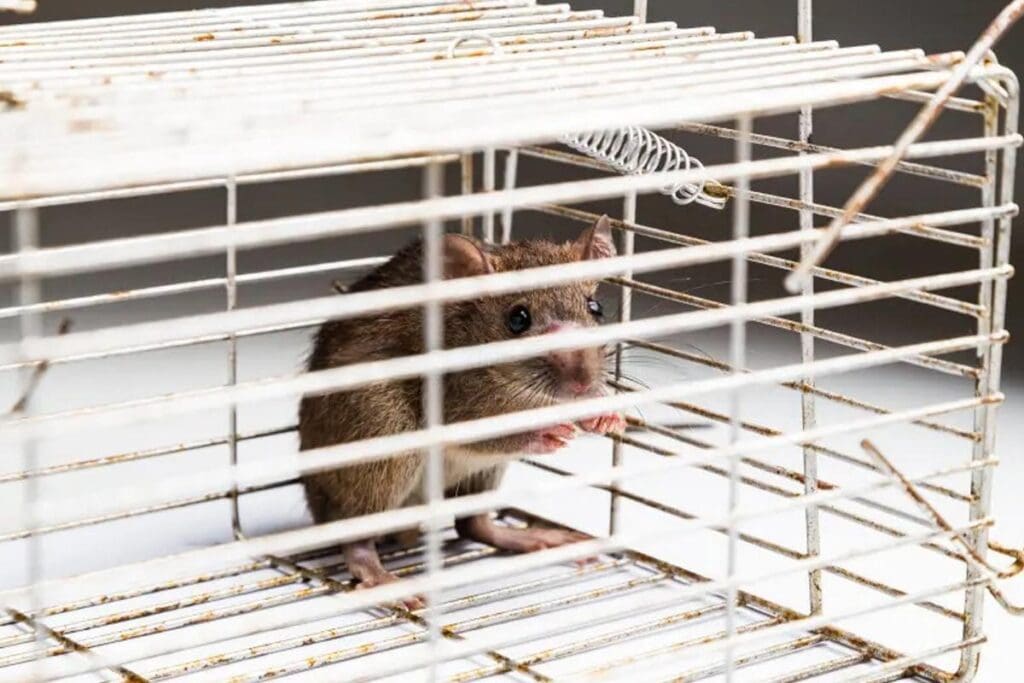Mice are more common in homes than many realize, frequently invading properties in Lansing, East Lansing, and nearby towns in Ingham and Eaton counties, such as Mason, Williamston, Charlotte, and Grand Ledge. Drawn to homes for the same reasons we live in them—shelter, warmth, and food—mice are remarkable creatures capable of chewing, climbing, or digging to gain entry. Common entry points include air conditioner lines, siding corners, missing mortar, garage door corners, crawl space vents, and gaps around the foundation. Mice can also scale cement walls, brick, stone, or wood siding and even climb trees to access roofs and attics.
When mice appear indoors, it’s often young ones scouting for new territory. Kitchen sightings typically suggest entry points near the foundation, with mice traveling up water lines or other pathways close to the floor. They also move along chimney chases, plumbing, and electrical runs. Homeowners in Lansing and East Lansing frequently report hearing scratching or pitter-patter noises from mice in attics. If you’re seeing mice, hearing them, or noticing signs like droppings or gnaw marks, contact Stewart Pest Solutions today to schedule a professional inspection and service.
Common Mouse Species in Mid-Michigan
In mid-Michigan, particularly Ingham County and Eaton County, the house mouse (Mus musculus) is the most prevalent species found in homes. Key characteristics include:
- Size: 2.5 to 3.75 inches long (plus a similarly long tail)
- Color: Light brown to gray with lighter bellies
- Behavior: Nocturnal, skilled climbers, and rapid breeders
- Evidence: Droppings, gnaw marks, and nests made of shredded materials
The deer mouse (Peromyscus maniculatus) is another species occasionally encountered, especially in rural areas like Williamston and Charlotte. Larger than house mice, with white bellies and feet, deer mice can carry hantavirus, making professional removal a priority.
Why Mice Are a Concern in Lansing and Nearby Areas
Mice present multiple risks to homeowners in Lansing, MI, and surrounding cities:
- Property Damage: They chew wires, insulation, and wood, risking electrical fires or structural damage.
- Health Hazards: Mice spread diseases like salmonella and hantavirus through their droppings and urine.
- Fast Breeding: A single pair can produce dozens of offspring in months, quickly leading to infestations.
Prompt, professional mouse control in Lansing is essential to address these threats.
Mouse Control Measures: Exclusion, Trapping, and Rodenticide
At Stewart Pest Solutions, we employ a thorough strategy to remove mice from homes in Lansing, East Lansing, and nearby areas like Mason and Grand Ledge. Our approach includes:
Exclusion
Blocking entry points is the foundation of mouse control. We seal gaps around:
- Foundations
- Pipes and utility lines
- Vents and chimneys
- Garage doors and siding corners
We use durable materials like steel wool, caulk, and metal flashing that mice cannot penetrate.
Trapping
We place snap traps and glue boards in high-traffic zones, such as:
- Along walls and baseboards
- Near food sources
- In attics and basements
Trapping is ideal for quickly reducing mouse numbers, particularly in sensitive areas like kitchens.
Rodenticide
For severe infestations, we deploy rodenticide baits in secure, tamper-proof stations in attics, basements, and crawl spaces. After consumption, the rodenticide takes 4-5 days to eliminate mice. Follow-up visits may be required to ensure complete eradication.
Our technicians customize each treatment plan to suit your home’s unique needs, delivering safe and effective results.
Mouse Prevention Tips for Mid-Michigan Homeowners
Keeping mice out of your home in Lansing or surrounding towns like Charlotte and Williamston requires proactive steps. Here’s how:
- Seal Entry Points: Regularly check and close gaps around doors, windows, and foundations.
- Clear Outdoor Attractants: Keep brush, firewood, and debris away from your home’s exterior.
- Secure Food: Store food in airtight containers, clean spills promptly, and don’t leave pet food out overnight.
- Maintain Landscaping: Trim tree branches away from the roof and prune shrubs to limit climbing access.
- Remove Bird Feeders: Birdseed attracts mice; remove feeders or switch to spill-proof options.
- Stay Tidy: Keep attics, basements, and crawl spaces clean to reduce nesting opportunities.
Pair these habits with professional pest control services in Lansing for lasting protection.
What to Expect During and After a Mouse Service
When you choose Stewart Pest Solutions for mouse control in Lansing, MI, or nearby areas, here’s the process:
Comprehensive Inspection
We start with a detailed assessment of your property. During a walk-and-talk with you, we pinpoint problem areas, explain why they’re vulnerable, and suggest simple sealing solutions. The inspection includes:
- Exterior: Checking the foundation, siding, vents, and roof access points.
- Basement: Looking for signs of mouse activity and movement patterns.
- Attic: Identifying evidence like droppings, tunneling, or food caches.
Tailored Treatment Plan
Using the inspection findings, we design a plan combining exclusion, trapping, and rodenticide as needed. Traps may be set in active areas, with rodenticide placed strategically in attics and basements.
Follow-Up Support
Mice can be tenacious, especially in older homes in East Lansing or Grand Ledge. Follow-up services ensure the infestation is fully resolved.
Trust Stewart Pest Solutions for Mouse Control in Lansing and Beyond
Don’t let mice overrun your home. With expert identification, customized treatments, and ongoing prevention, Stewart Pest Solutions eliminates mice and keeps them out. Proudly serving Lansing, East Lansing, Mason, Williamston, Charlotte, Grand Ledge, and all of Ingham and Eaton counties, we’re your local experts in mouse control.
Ready to take back your home? Contact Stewart Pest Solutions today for a free inspection and reliable mouse control services in mid-Michigan!

